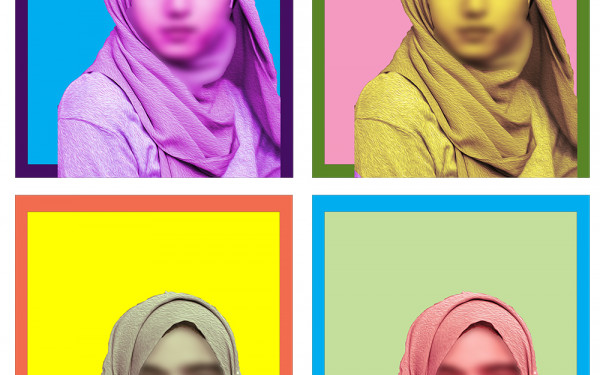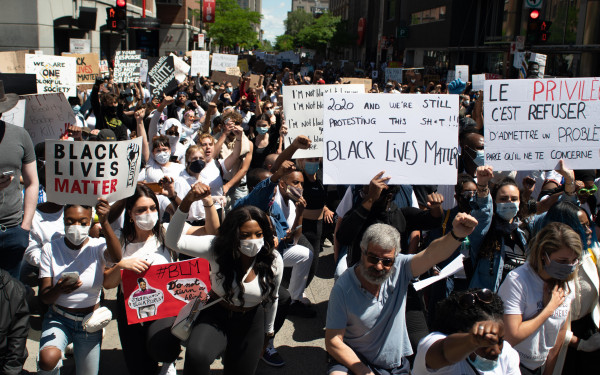Our Society Can’t Simply Cower Away From Discussing Racism
We Need to Expand the Conversation Surrounding Racism and Xenophobia
Many problematic and dangerous events have recently taken place regarding migration and xenophobia at home and abroad. They require our careful attention.
At the provincial level, the same government that bans hijabs and burkas called for a consultation on systemic racism. Demonstrations against racism have also multiplied and heinous acts and discourse are rising at an alarming rate. We need to review these developments in the hopes of better addressing the situation and prospects of progress at hand.
What’s Going On?
It is arguable that a positive turn is taking place in the general understanding of urgency in addressing the toxic social dynamics in Quebec and Canada. But it’s clear that the necessary dialogues around racism and xenophobia are hindered by a lack of genuine concern in the matter. They are wholly prevented by cultural norms that devalue the uncomfortable conversations that should be more broadly taking place throughout society.
Not too long ago, the Parti Québécois proposed its Charter of Values. The Liberal Party called for, and subsequently cancelled last fall, the consultation on systemic racism, and at the same time passed the Islamophobic face-covering ban Bill-62. A normalization of scapegoating narratives is taking place in popular discourse, where major political parties are openly blaming of our social malaise on refugee claimants, people of colour, Muslim people, and migrant communities.
We are witness to a concretization of racist populism: the rise of European far-right groups and parties, U.S. President Donald Trump’s election and his administration have reinforced systemic discrimination and barriers, and bolster each other’s rhetoric and concrete power. The two largest far-right demonstrations in Quebec since the 1930s took place last year in Quebec City.
A lot is happening before our eyes, but such is the rhythm of times we live in.
Jan. 29 marked the first anniversary of the tragic mosque shooting in Quebec City. A 27-year-old Quebecer known for following far-right groups and admiring far-right politicians took it upon himself to act on a well-nourished racist ideology, killing six innocent people and injuring 19.
With all of these terrifying events taking place, can we make space for a genuine discussion that addresses these issues’ underlying causes?
How is it that such a xenophobic climate is unfolding, yet we fail to find grounds on which to stand on? We struggle to learn from our past failures and experiences, on which there is great potential to build. In the hopes of progressing and moving forward collectively, is there an appropriate way to have an honest dialogue? Is it possible at all?
When columnists known for their racism continually speak on the defensive, calling other folks this and that, they attempt to drown the conversation before it even starts. When a consultation on systemic racism is called by the same government that bans burkas, there are clear questions as to how such conflicting events could provide any basis for a healthy conversation—the contradictions that underpin public discourse need to be exposed before an honest debate can take place.
When folks and members of civil society choose to remain silent because it is uncomfortable to have such conversations, then—with all these factors in mind—we, as a society, have successfully hushed the central dialogue.
Finding the Appropriate Tone
There is a continuous thread line in modern Western culture that works by confining what makes us uncomfortable to the
margins of the public debate in the hopes of ultimately avoiding difficult conversations.
An acceptable modern debate requires an acceptable modern tone, a tone that should never make anyone uncomfortable or create discontent, nor should it question foundational causes that brought us to the very situation we find ourselves in today. If
this tone deviates from what is socially acceptable, then afflicted voices cannot speak and an honest conversation cannot take place.
There are all too many cases of injustice and tragedy that cannot be expressed in words. There all too many cases of harm that continue to occur because they cannot be named. Should they be identified, they are far too often dismissed because the very way in which they were brought forth was not considered acceptable in tone. This mode of adequate social participation in the public sphere is one that requires status, income, privilege, and all such social advantages that people in distress simply do not have.
If silence and complacency dictate the tone of the conversation because we are worried about making people uncomfortable, then critical views cannot be expressed, crucial voices cannot be heard, and, as a whole, a lot will simply be omitted or deemed unacceptable in public debate. What is mostly stalling the conversation is not the will nor the evidence brought forward, but rather it is the fixation on civility as the only adequate mode of engagement. If we wish to address these issues more seriously and concretely, we need to acknowledge, and accept that there will inevitably be discomfort.
Let’s Talk About It
If there are limitations preventing us from discussing these issues, there are indeed ways to transcend these boundaries by acknowledging that processes of change come accompanied with discomfort.
The current context of social change and movements that attempt to break sociopolitical stigmas, such as the movement against sexual assault, demonstrate that social discomfort can be part of tangible positive change. It only seems healthy that to see possible progress is to reconsider our priorities. That is, if we acknowledge that part of the process of social change might cause negative reactions, and that conveying a critical disruptive message can change a certain state of affairs, we also have to recognize the value of speaking unhindered by tone. Discomfort is part of the process.
What needs to be clear is that what is divisive about the current social context is not the act of denouncing harmful ideologies, but rather the choice to be silent and complacent about said ideologies. To frame an honest social debate about these issues, it is crucial to define it not as a conflict between those who are upset and those who stay civil, but rather to expose racism as a social ill that requires explicit denunciation and responsible, timely and active consideration by society as a whole.
Moving forward with these issues, we can then envision a healthy conversation that addresses the root causes of social conditions, and engage in an honest, multifaceted far-reaching dialogue as a society.







